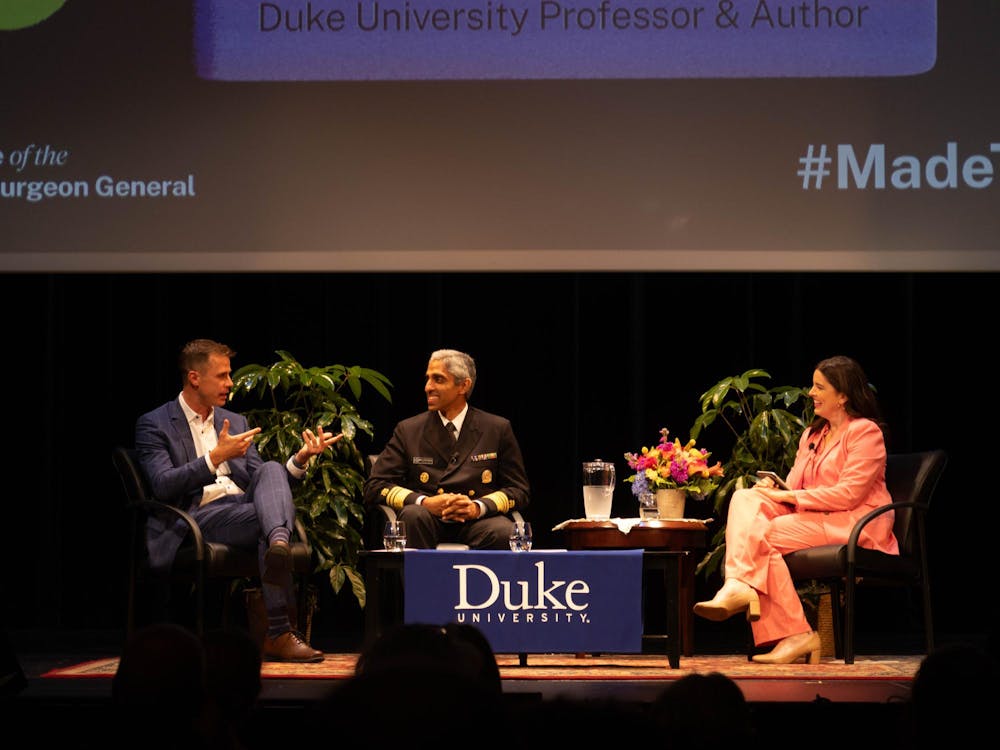U.S. Surgeon General Vivek Murthy and Duke men’s basketball coach Jon Scheyer spoke Wednesday in Page Auditorium about the “public health issue” of loneliness as part of the first stop on Murthy’s “We Are Made To Connect” national tour.
The event, moderated by Kate Bowler, associate professor of American religious history, discussed how college students can build connections in their daily lives to promote social and mental well-being.
Murthy opened the discussion by talking about loneliness as a “public health issue” that must be addressed “with great urgency.”
“When we struggle with that sense of social disconnection, it turns out it increases our risks for depression, anxiety and suicide, but also for physical illness, for heart disease, for dementia and for premature death,” he said.
Earlier this year, Murthy released a new public advisory that noted the adverse effects of increased social media usage on the physical and emotional health of the youth. A research study that Murthy cited in his advisory found that adolescents are exposed to “double the risk of experiencing poor mental health outcomes” after spending more than three hours per day on social media.
Scheyer joined the conversation by reflecting on how he overcame isolation when he suffered a career-ending injury in his right eye while playing in the National Basketball Association’s summer league.
He believed that the people in his life who showed up “made a huge difference,” mentioning how he received “amazing support” from his family, former Duke men’s basketball coach Mike Krzyzewski and Duke.
“The moment I [feel] the best is when I end up reaching out to people and when you get outside of your bubble,” Scheyer said. “They may not give you the response you're hoping for, you know, but the message has been delivered.”
The impact of social media on relationships
Forging close interpersonal relationships has become challenging in the digital age. Murthy explained how social media has “shifted the nature of our interaction with friends” to a point where one’s quantity of friendships is more important than the quality of them.
“If we want to get back to the roots of truly satisfying relationships and the essence of them, we have to remember we evolved over thousands of years of process, not just the content of your speech, but the tone of your voice, your body language, the expression on your face,” he said.
According to Murthy, social media is also a source of distraction, “not just for young people, but for everyone.” He noted that people lose their attention quickly, whether while getting social media alerts or “check[ing] your inbox” and it can often take up to 20 minutes to “regain your focus once you lose it.”
Murthy pointed out that there are several common concerns confronting young adults when they are on social media. Teens often “feel worse about themselves” as they “constantly compare themselves to other people’s lives, their accomplishments, their looks.” When they see other friends “doing stuff that seems fun and extra exciting but without them,” teens feel anxious about their own friendships. Murthy warned that social media is addictive and young adults “can’t get off it totally.”
“What’s happening is that these products are designed to maximize how much time we spend on them. Because that's what the revenue model is based on,” he said. “... So it’s not that we’re bad or broken or not disciplined. It’s that, in some ways, we’re the victims of what the apps are trying to do.”
To relieve his players from the pressures of social media and “expectations for immediate success,” Scheyer hosts values meetings for his basketball team to instill a sense of trust and connection.
“There’s so many different vehicles that can break up trust now, especially for a college athlete, when you think about the space that they’re in,” Scheyer said. “... The special part is, our guys now are getting to the point where they’re telling each other the truth in real time. They’re confronting each other. ‘Hey, Kyle, I need you now’ or ‘Tyrese pick it up, or you’re doing great.’ ”
Murthy then invited the audience to join the “five-for-five challenge,” which involves taking five actions over the next five days to strengthen connections and friendships. These actions pertain to expressing gratitude, asking for help or extending support to someone.
At the end of the event, Murthy asked members of the audience to take their phones out and send a text message or email to “that person that you're grateful to.” Murthy then urged everyone in the audience to turn their phones’ flashlights on and hold them up.
“Think about the hundreds of lights that are shining right now. Each of these represents a connection that has gone out into the world. Somebody’s going to receive that message,” he said. “They’re going to be surprised and grateful that you remember them.”
Get The Chronicle straight to your inbox
Signup for our weekly newsletter. Cancel at any time.
Lucas Lin is a Trinity first-year and a university news editor of The Chronicle's 120th volume.

